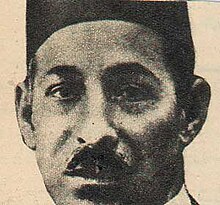Mustafā Sādiq ar-Rāfiʿī
Mustafā Sādiq ar-Rāfiʿī ( Arabic مصطفى صادق الرافعي, DMG Muṣṭafā Ṣādiq ar-Rāfiʿī ; * January 1, 1880 in Bahtin in the Nile Delta ; † May 14, 1937 in Tanta ) was one of the most famous Arab poets of the early 20th century. He was of Egyptian - Syrian descent. ar-Rāfiʿī wrote the text of the Egyptian national anthem " Eslami ya Misr ", which was used from 1923 to 1936. In addition, together with Abu al-Qasim al-Shabbi, he designed the text for the Tunisian national anthem " Humat al-hima " (Defender of the Fatherland) , which has been used since 1987 .
Life
Mostafa Saadeq al-Rafe'ie was born in Bahtin because his mother wanted to bear her firstborn in her father's house. He came from a merchant family and spent his life in Tanta, where he attended elementary school. At the age of 30 he contracted typhus , which forced him to spend a few months in bed. Because of the illness, he lost his hearing forever.
job
In Awraq al-Ward, Rafe'ie philosophizes about love and beauty. Whereby he defends many traditional Arab customs and Islamic values in Hadith al-Qamar. But in Kitab al-Masakin, what is written in prose , also addresses other values such as, poverty, charity and compassion. Not only did he philosophize, but he also wrote non-fiction books such as Tarikh Adab al-Arab, which is not the history of the Arabic language but a collection of data on the Arabic language. The collection is written in elegant prose and shows his good handling of this language.
Works
- Al-Sahab al-Ahmar
- Awraq al-Ward (1931)
- Dewan Mustafa Sadiq Rafi'i
- Hadith al-Qamar (1922)
- Iʿǧāz al-Qurʾān wa-l-balāġa an-nabawīya (1928)
- Kitab al-Masakin (1917)
- Rasa'il al-Ahzan
- Tarikh Adab al-Arab (1911)
- Wahy al-Qalam
Web links
- Works at alkitab.com
| personal data | |
|---|---|
| SURNAME | Rāfiʿī, Mustafā Sādiq ar- |
| ALTERNATIVE NAMES | Rafii, Mustafa Sadik el- |
| BRIEF DESCRIPTION | arab poet |
| DATE OF BIRTH | January 1, 1880 |
| PLACE OF BIRTH | Bahtin, Nile Delta |
| DATE OF DEATH | May 14, 1937 |
| Place of death | Tanta , Egypt |
